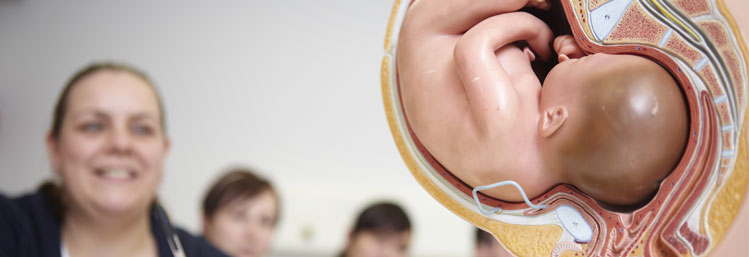
Midwifery
BSc (Hons)
- Typical offer for 2025
- Duration
- UCAS code
- Start date
- Location
Suitable for applications.
Bradford don’t want to put you in a mould, they’d rather build a mould around you. They're not trying to mass produce us into the same type of midwife - you’re the midwife you want to be.
Teaching, learning and assessment
The curriculum is based on the principles of active and collaborative learning, underpinned by the educational philosophy inherent in problem-based learning. Students are integral to learning situations that are participatory and collaborative.
A variety of workshops will introduce you to simulation, using creative media, for example filmmaking and games, using play to enhance learning. e-Portfolios will be used to support you in documenting personal, academic and clinical learning gains and development throughout the programme, building skills in critical reflection, action planning and self-evaluation.
You will examine perspectives of women’s health in a national and international context, and be introduced to core principles in the use of literature, social, cultural, psychological and ethical concepts, providing you with the early skills you need to work under the direct guidance of the midwife. You will gain an understanding of the rationale for support provided to women; the focus will be on the local community and key health and well-being priorities.
Your practice skills will be underpinned by key lectures and workshops that integrate anatomy, physiology and sociological concepts. At the early stage of the degree you will be supported by series of underpinning study skills and learning activities, that will also develop your critical appraisal and IT skills, and individual self-awareness and resilience.
As the programme progresses independent learning is increased; new study skills related to research interpretation, along with learning activities and authentic scenarios bring together more complex concepts. Your focus will move to take on a national perspective of health and wellbeing and societal issues for women and their families. Key lectures and workshops will develop your confidence in decision making within midwifery situations, including care for women with increasingly complex needs.
In your final year you will be supported in applying your skills and knowledge to a critical review of a global aspect of maternal well-being in order to identify areas for potential practice development. Theoretical concepts of leadership and change management will add depth to your study, and you will explore complex clinical and global maternal health issues.
Practice placements will enable you to progress from indirect supervision to long arm supervision during the case loading placement, demonstrating sound decision-making and leadership skills. The theoretical weeks will vary from 35 – 40 hours per week and the practice weeks an average of 24 hours per week in practice with two days for self-directed study. Clinical placement is supported by your allocation to an NMC Practice Assessor (NMC 2019). You will work with a number of Practice Supervisors to facilitate learning opportunities in each placement area. You will record your experiences and evidence of placement learning in your eMORA document.
Assessment complies with NMC requirements for pre-registration midwifery programmes (Nursing and Midwifery Council 2023). It addresses the need to assess knowledge, understanding and skill and their application in midwifery practice. The assessment strategy also reflects the need to ensure that the programme produces midwives who are safe in practice and fit for academic award.
Assessment methods include:
- ipsative multiple-choice questions (MCQ)
- individual and group presentations
- written assignment and critical writing
- ePortfolio
- annotated bibliography
Study support
You will be allocated a Personal Academic Tutor who will provide you with pastoral and academic support throughout your time with us.
University central services are rich with support teams to assist students with every aspect of their journey through our degree programmes. From our Career and Employability Service, through our strong Students' Union, to our professional and efficient Student Finance team, there are always friendly faces ready to support you and provide you with the answers that you need.
Our Virtual Learning Environment allows students to access resources, participate in group work and submit work from anywhere in the world 24/7.
Research
Terms and conditions of study
The University has a set of terms and conditions for all students accepting an offer to study on a course here at Bradford. This is called The Student Contract. This document sets out the Terms and Conditions which apply when you accept an offer of a place on a programme of study at the University of Bradford.
View our Student Contract for further details.
Transparency statement
Information about this programme and its modules has been published in advance of the academic year to which it applies. Every effort has been made to ensure that the information is accurate at the time of publication, but changes may occur given the interval between publishing and commencement of teaching. Any change which impacts the terms and conditions of an applicant’s offer will be communicated to them.

